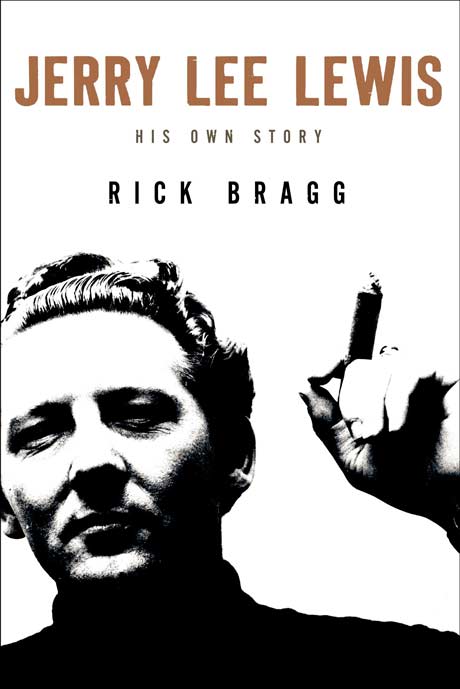For a brief moment in time, it seemed as if Jerry Lee Lewis — the piano prodigy who first broke in the 1950s — would overtake Elvis Presley and become the reigning king of rock'n'roll. Instead, he's been relegated to a mere footnote in musical history (at least in most modern day minds), an afterthought for those not around during his original run or unaware of rock music's roots.
In a market featuring an overabundance of rock biographies, Pulitzer Prize-winning journalist Rick Bragg's new book on the classic heartthrob may sound like a bit of a boring read, but Jerry Lee Lewis: His Own Story is actually one of the more fascinating tales to be found in the genre.
A lot of thanks must go to Bragg himself, a man whose plainspoken, Southern vernacular makes this a tremendously easy read. Rather than turn his conversations with the musical legend into some sort of overwrought, first-person prose (I'm looking at you, Neil Strauss), Bragg presents his own research on the singer's life, much like one of his previous pieces for the New York Times, simply choosing choice quotes from their conversations — a series that unfolded over many months together — to help illustrate a moment or corroborate a particularly far-fetched story.
And what stories Lewis has to tell. Born in Ferriday, Louisiana in 1935, the man that would become more commonly known as "The Killer" — after trying to strangle one of his teachers with their own tie, of course — was at ground zero for the birth of rock, helping elevate it from a simple hillbilly pastime into the wings of major concert halls with his rollicking piano rolls and propulsive playing.
Like most musical biographies, the book pays heavy attention to his early years, describing his first encounters with the piano, the blues, women, fame and fortune, as well as the ensuing roller coaster ride that was his career as he struggled to stay afloat in the music world's changing tides and the public's ever-shifting opinion of the performer (this was a man who nearly destroyed his career in the late '50s after marrying his cousin when she was only 13 years old).
As the book nears its end and focuses on the latter half of Lewis' life — a time riddled with divorces, remarriages, the death of his children, tax evasions, drugs, health concerns and his ultimate return to the stage — you may find yourself googling his name, surprised to discover that he's still alive (he's currently 79, in case you were wondering) and still touring (dates in England are being planned for 2015), especially after all the crazy stories are told. But it's Lewis' refusal to roll over and die that ultimately adds to his legend, as well as the enjoyment of this book; while other rock and rollers feign God-like status on stage, Jerry Lee Lewis seems like the real deal in all facets of his life.
(Harper Collins)In a market featuring an overabundance of rock biographies, Pulitzer Prize-winning journalist Rick Bragg's new book on the classic heartthrob may sound like a bit of a boring read, but Jerry Lee Lewis: His Own Story is actually one of the more fascinating tales to be found in the genre.
A lot of thanks must go to Bragg himself, a man whose plainspoken, Southern vernacular makes this a tremendously easy read. Rather than turn his conversations with the musical legend into some sort of overwrought, first-person prose (I'm looking at you, Neil Strauss), Bragg presents his own research on the singer's life, much like one of his previous pieces for the New York Times, simply choosing choice quotes from their conversations — a series that unfolded over many months together — to help illustrate a moment or corroborate a particularly far-fetched story.
And what stories Lewis has to tell. Born in Ferriday, Louisiana in 1935, the man that would become more commonly known as "The Killer" — after trying to strangle one of his teachers with their own tie, of course — was at ground zero for the birth of rock, helping elevate it from a simple hillbilly pastime into the wings of major concert halls with his rollicking piano rolls and propulsive playing.
Like most musical biographies, the book pays heavy attention to his early years, describing his first encounters with the piano, the blues, women, fame and fortune, as well as the ensuing roller coaster ride that was his career as he struggled to stay afloat in the music world's changing tides and the public's ever-shifting opinion of the performer (this was a man who nearly destroyed his career in the late '50s after marrying his cousin when she was only 13 years old).
As the book nears its end and focuses on the latter half of Lewis' life — a time riddled with divorces, remarriages, the death of his children, tax evasions, drugs, health concerns and his ultimate return to the stage — you may find yourself googling his name, surprised to discover that he's still alive (he's currently 79, in case you were wondering) and still touring (dates in England are being planned for 2015), especially after all the crazy stories are told. But it's Lewis' refusal to roll over and die that ultimately adds to his legend, as well as the enjoyment of this book; while other rock and rollers feign God-like status on stage, Jerry Lee Lewis seems like the real deal in all facets of his life.
